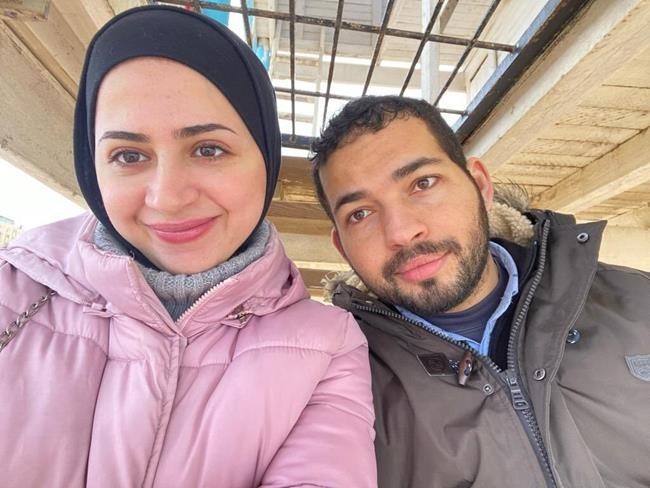OTTAWA — An Ontario woman fears her brother's death in Gaza will disqualify his pregnant wife from a forthcoming program to help extended family escape to safety.
Shaymaa Ziara was elated last Spring, shortly after giving birth to her own child, when her brother called to tell her that he was about to become a father.
Omar Ziara and his wife, Safaa Mousa, had been trying to get pregnant since they got married in March 2021. The couple met a year earlier as colleagues and fell in love.
Omar announced the pending birth to his mother and sister by phone while his mother was visiting Canada from Gaza.
"He's going to be a baby boy. They waited for him for quite a long time, and they were super excited," Shaymaa Ziara said in an interview.
"We were over the moon with it, we were super happy."
In November she got a much more painful phone call from another one of her brothers, who told her that Omar Ziara had been killed in an explosion outside of their aunt's house in Gaza, and that she would have to tell her mother the news.
"It was just incredibly difficult after that. To this day there, there's not a moment that passes by that we can't think of him," Shaymaa Ziara said
"Our hearts are breaking for him and his wife and his unborn baby."
The Ziaras are among hundreds of Palestinian-Canadians who have petitioned the government for months to offer refuge to their extended family members in Gaza until the violence gripping the Palestinian territory finally ends.
Ziara's father, sister-in-law and remaining siblings have had to relocate several times since Oct. 7, when Hamas attacked Israel, killing 1,200 people and taking 250 others hostage.
Israel almost immediately launched a retaliatory attack on the Hamas-controlled Gaza Strip and cut off access to supplies. Civilians there have lived under the constant threat of airstrikes, ground assaults and starvation as Israel pursues Hamas. Local health authorities say 22,400 people have been killed in Gaza since the violence erupted in October.
The Canadian government is expected to open visa applications Tuesday to allow as many as 1,000 extended family members of Canadians and permanent residents to escape the conflict.
Canada's existing program is available only to immediate family members of Canadians, including spouses and children.
The expansion will add parents, grandparents, adult children, grandchildren and siblings of Canadians and Canadian permanent residents, as well as their immediate family members.
Immigration Minister Marc Miller has warned, however, that Canada cannot guarantee that any of them will be able to cross the tightly-controlled border from Gaza into Egypt.
Shaymaa Ziara's sister-in-law, who is now seven months pregnant, would have qualified for the extended reunification program if not for the fact Ziara's brother was killed.
The policy requires that the application for consideration under the program be filed by the person in Gaza directly related to a Canadian. In this case that would have been Omar Ziara, filing the application for himself and his wife.
"I'm really, really concerned because she's due early March, and the hospital system is completely collapsed," Ziara said.
"I'm desperately hoping that I can also get her out so that she can at least give a birth in a safe place."
Immigration, Refugees and Citizenship Canada said in a statement that it would consider specific eligibility issues on a case-by-case humanitarian and compassionate basis, as much as possible.
"Our focus is on keeping families together and bringing them to safety as quickly as possible," the department said in the statement Monday.
Toronto immigration lawyer Yameena Ansari said she would love to see that sentiment formally added to the policy. As it stands now, she is advising clients to prioritize the safety of the family member with a connection to Canada.
"This is the type of conversation that I don't like to have with clients, but that I am having with clients," said Ansari.
She advocated for special visas for extended family members in Gaza as part of an ad hoc group of immigration lawyers called the Gaza Family Reunification Project.
She said the policy as written adds another layer of fear and anxiety about whether family members will still be alive when applications open.
Ziara said she has reached out to the government about her sister-in-law's case, but has received only a generic response laying out the existing policy, which would prohibit Mousa from receiving a visa.
If the government acted sooner, Ziara wonders if her brother would have been alive to apply for himself, his wife and unborn child.
This report by The Canadian Press was first published Jan. 8, 2024.
Laura Osman, The Canadian Press



